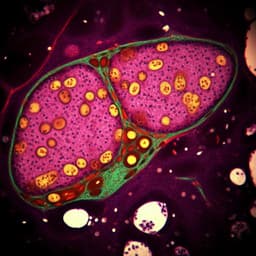
Medicine and Health
Effects of Mediterranean diet during pregnancy on the onset of overweight or obesity in the offspring: a randomized trial
S. Coppola, L. Paparo, et al.
The PREMEDI study reveals groundbreaking findings on the impact of a Mediterranean Diet during pregnancy, showing a significant reduction in the incidence of overweight or obesity in offspring at 24 months. This research, conducted by a team including Serena Coppola and Lorella Paparo, uncovers intriguing epigenetic modifications linked to dietary choices.
~3 min • Beginner • English
Introduction
Pediatric obesity is a major public health issue, and early-life periods represent windows of opportunity for prevention. Maternal diet during pregnancy may influence offspring obesity risk through developmental programming, including epigenetic mechanisms. The Mediterranean Diet (MD), rich in fiber, antioxidants, polyphenols, vitamins, and balanced essential fatty acids, is associated with health benefits and lower excess weight in adults. Observational evidence suggests MD during pregnancy may protect against overweight/obesity in offspring, potentially via epigenetic modulation of gene expression, but randomized controlled evidence is lacking. The PREMEDI randomized controlled trial was designed to evaluate whether MD nutritional counseling during pregnancy reduces the incidence of overweight/obesity at 24 months in the offspring.
Literature Review
Prior studies have reported mixed findings regarding MD during pregnancy and offspring adiposity. The Spanish INMA cohort (n≈1827) reported no association with childhood overweight/obesity but an inverse association with waist circumference. In contrast, Project Viva (USA, n=997) and the Rhea study (Greece, n=569) found maternal MD adherence associated with lower BMI SD scores in children aged 4–10 years. The NEST cohort (n=929) linked higher maternal MD adherence with lower body size at birth and sustained effects at ages 3–5 and 6–8 years. A cross-sectional study of dietary counseling in pregnant women with obesity reported that MD adherence was associated with reduced gestational weight gain, lower newborn birth weight and fat mass, and lower cord leptin levels. Overall, evidence prior to PREMEDI was largely observational and heterogeneous, underscoring the need for randomized trials.
Methodology
Design: PREMEDI was a randomized, parallel-group, controlled trial evaluating the effect of Mediterranean Diet nutritional counseling during pregnancy on offspring overweight/obesity at 24 months.
Setting and period: Villa Betania Evangelical Hospital, Naples, Italy; recruitment between November 30, 2017 and January 31, 2021.
Participants: Pregnant women in the first trimester consecutively assessed at a tertiary center. Inclusion: Caucasian ethnicity; age 20–35 years. Exclusion: documented infections during pregnancy; twin pregnancy; malignancies; congenital malformations; immunodeficiency; diabetes mellitus and other chronic diseases; chronic inflammatory bowel diseases; functional gastrointestinal disorders; celiac disease; history of abdominal surgery; neurological/neuropsychiatric disorders; vegan diet. Written informed consent obtained.
Randomization and allocation concealment: Central randomization 1:1 to MD or control (CT) using Stata ralloc with block size 2. Treatments were consecutively numbered per the randomization list known only to the study coordinator.
Blinding: Participants could not be blinded. Outcome data were collected by physicians and pediatric nurses unaware of study aims and group assignment.
Interventions: CT arm received standard obstetrical/gynecological care including guidance on energy intake, physical activity, recommended gestational weight gain (per pre-pregnancy weight), and food safety. MD arm received standard care plus personalized MD counseling by certified dietitians in three face-to-face sessions: enrollment (8–13 weeks), ~3 months (14–28 weeks), and ~6 months (29–40 weeks). Counseling emphasized: extra-virgin olive oil as main fat (≥4 tbsp/day); vegetables 2 servings/day; fruit 3 servings/day (avoid juices); wholegrain cereals 3 servings/day; skim dairy 3 servings/day; legumes 3 servings/week; fish 3 servings/week; nuts/seeds 3 servings/week; water 2 L/day; low intake of red/processed meats; avoidance of refined grains and ultraprocessed foods (processed baked goods, pre-sliced bread, soft drinks, fruit juices, precooked meals).
Outcome measures: Primary—proportion of children with overweight/obesity at 24 months using IOTF BMI cut-offs. Prespecified intention-to-treat (ITT) analysis; sensitivity analyses with best- and worst-case scenarios for missing data. Secondary/non-primary—maternal adherence to MD (MedDiet 14-item score, adequate ≥9), maternal gestational weight gain, and epigenetic modulation of metabolic pathways in offspring (cord blood). Non-primary outcomes analyzed per-protocol (PPA).
Data collection and follow-up: Baseline demographic, clinical, and lifestyle variables collected by gynecologists and dietitians. MedDiet Score assessed each trimester. Cord blood (≥10 ml) collected at delivery in the first 11 women in each arm for methylation analyses. Offspring follow-up every 3 months in the first year and every 6 months until 24 months; blinded pediatric team recorded clinical history, growth, and diagnoses. Anthropometry: weight measured twice naked on calibrated scales (Seca 834 or Seca 711); length measured twice supine (Seca 210 board); third measure if discrepancy >100 g (weight) or >5 mm (length).
Laboratory methods: Cord blood genomic DNA extracted (GE Healthcare kit). Genome-wide methylome assessed using Illumina Infinium EPIC 850k array; quality control, batch and covariate assessment, methylation distributions, and differential methylation analyses performed using RnBeads. Mann–Whitney U tests for differentially methylated CpGs/promoters/islands; PCA and hierarchical clustering performed. Targeted leptin promoter methylation assessed via amplicon-bisulfite sequencing: bisulfite treatment; two-step PCR (first PCR with bisulfite-specific leptin primers; second PCR to add Nextera XT indices); purification with magnetic beads; quantification (Qubit 2.0); equimolar pooling; library at 8 pM with 10% PhiX; sequencing on Illumina MiSeq (V2-nano kit). Detailed thermocycling conditions provided in the manuscript.
Sample size: Assumed 25% incidence of overweight/obesity at 24 months; to detect an absolute 20% difference with alpha 0.05 and power 80%, 49 pairs per group required (Pearson chi-square). With 5% anticipated dropout, 52 per group (total 104) enrolled.
Statistical analysis: Main outcome analyzed by Pearson’s Chi-square; absolute risk difference and 95% CI from binomial regression with treatment as predictor (ITT and PPA); models adjusted for baseline maternal weight or BMI (PPA). Maternal MedDiet Score and body weight analyzed with random-effects linear regression with treatment, trimester, and treatment×time interaction; mother as random effect; Bonferroni-corrected within-time contrasts. Leptin methylation compared by unpaired Student’s t test. Analyses performed with Stata 18.5 and GraphPad Prism 7.0.
Key Findings
- Participant flow: 110 assessed; 6 excluded (5 ineligible, 1 declined); 104 randomized (MD 52, CT 52). Lost to follow-up: MD 5/52 (9.6%), CT 2/52 (3.8%); 97 completed.
- Primary outcome (offspring overweight/obesity at 24 months):
• Per-protocol: MD 3/47 (6%, 95% CI 1–17%) vs CT 15/50 (30%, 95% CI 18–45%); absolute risk difference −24% (95% CI −38% to −9%); p = 0.003; number needed to treat (NNT) 4 (95% CI 2–12). Adjustment for baseline maternal weight or BMI did not materially change estimates (−24% and −23%, respectively).
• ITT best-case (assign positive outcome to MD missing, negative to CT missing): absolute risk difference −27% (95% CI −41% to −13%); p < 0.001.
• ITT worst-case (assign negative to MD missing, positive to CT missing): absolute risk difference −14% (95% CI −29% to 2%); p = 0.098; direction preserved but below detectable difference with available sample size.
- Maternal MD adherence (MedDiet Score, PPA): Greater increase in MD arm vs CT.
• Between-group mean differences (MD−CT), Bonferroni-corrected: 1st trimester 0.7 (−0.1 to 1.6; p = 0.08); 2nd trimester 3.0 (2.2 to 3.8; p < 0.0001); 3rd trimester 4.1 (3.2 to 4.9; p < 0.0001). Mean MedDiet Score in MD arm ≥9 from 2nd trimester.
- Maternal weight gain (PPA): Similar between groups across trimesters; Bonferroni-corrected p ≥ 0.95 for all comparisons. Example adjusted means: 1st trimester CT 67.3 kg vs MD 67.2 kg; 2nd trimester CT 70.6 vs MD 71.2; 3rd trimester CT 75.9 vs MD 75.7. Corresponding MD−CT differences: −0.01 kg (1st), +0.6 kg (2nd), −0.2 kg (3rd).
- Epigenetics:
• Genome-wide methylome (n=11 per arm): PCA and hierarchical clustering showed no clear group separation, likely due to high inter-individual variability and small sample size.
• Targeted leptin promoter methylation (cord blood): mean (SD) 30.4 (1.02)% in MD vs 16.9 (2.99)% in CT; p < 0.0001; higher methylation at all analyzed CpG sites in MD group.
Discussion
The PREMEDI RCT demonstrates that nutritional counseling promoting the Mediterranean Diet during pregnancy substantially reduces the risk of overweight/obesity in offspring at 24 months. This directly addresses the need for early-life preventive strategies against pediatric obesity and provides randomized evidence beyond prior observational findings. The intervention significantly improved maternal adherence to MD without affecting gestational weight gain, suggesting the protective effect on offspring adiposity is not mediated by maternal weight gain differences during pregnancy. The higher methylation of the leptin gene promoter in cord blood from the MD group suggests an epigenetic mechanism—potential downregulation of leptin expression—linking maternal diet to fetal programming of energy balance. While genome-wide methylation analyses did not show group separation (likely due to limited sample size and high inter-individual variability), the targeted leptin findings align with prior reports of lower cord leptin with MD adherence. Collectively, the results support MD counseling in pregnancy as a feasible and potentially impactful approach to reduce early childhood overweight/obesity risk.
Conclusion
Nutritional counseling to promote adherence to the Mediterranean Diet during pregnancy reduced the incidence of overweight/obesity in offspring at 24 months and was associated with increased methylation at the leptin gene promoter in cord blood, suggesting an epigenetic contribution. MD during pregnancy appears to be a safe, effective, and potentially cost-saving strategy to combat pediatric obesity. Future research should include larger, multi-center RCTs, assessment of additional biomarkers of MD adherence, longer-term follow-up beyond 24 months, and expanded epigenomic and microbiome analyses to elucidate mechanisms.
Limitations
- Participants could not be blinded due to the nature of the dietary intervention.
- Relatively small sample size, particularly for epigenome-wide analyses (n=11 per arm), limiting power to detect genome-wide methylation differences and affecting generalizability.
- Lack of evaluation of other biomarkers of MD adherence.
- Limited number of cord blood samples for methylome analyses.
- Single-center study in a specific demographic (Caucasian women aged 20–35), which may limit generalizability.
Related Publications
Explore these studies to deepen your understanding of the subject.







